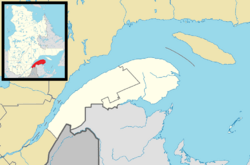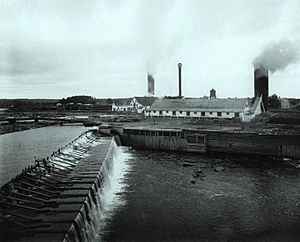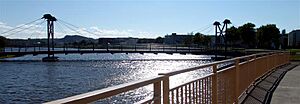Matane facts for kids
Quick facts for kids
Matane
|
||
|---|---|---|
|
Town
|
||
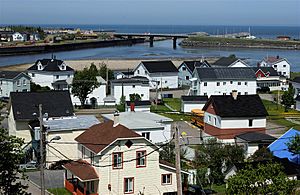 |
||
|
||
| Motto(s):
Le succès dans l'effort (Success in effort)
|
||
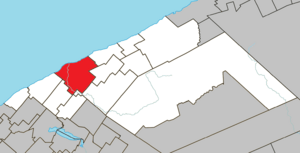
Location within La Matanie RCM
|
||
| Country | Canada | |
| Province | Quebec | |
| Region | Bas-Saint-Laurent | |
| RCM | La Matanie | |
| Constituted | September 26, 2001 | |
| Area | ||
| • Total | 230.44 km2 (88.97 sq mi) | |
| • Land | 195.49 km2 (75.48 sq mi) | |
| • Urban | 10.16 km2 (3.92 sq mi) | |
| • Metro | 865.87 km2 (334.31 sq mi) | |
| Population
(2021)
|
||
| • Total | 13,987 | |
| • Density | 71.5/km2 (185/sq mi) | |
| • Urban | 10,371 | |
| • Urban density | 1,020.7/km2 (2,644/sq mi) | |
| • Metro | 18,474 | |
| • Metro density | 21.3/km2 (55/sq mi) | |
| • Pop (2016–21) | ||
| • Dwellings | 7,482 | |
| Demonym(s) | Matanais, Matanaises | |
| Time zone | UTC−5 (EST) | |
| • Summer (DST) | UTC−4 (EDT) | |
| Postal code(s) |
G4W
|
|
| Area code(s) | 418 and 581 | |
| Highways | ||
| Geographical code | 24 08053 | |
Matane is a town located in Quebec, Canada. It sits on the south shore of the Saint Lawrence River, right where the Matane River flows into it. Matane is also part of the Gaspé Peninsula, a beautiful area known for its stunning scenery.
The town of Matane is the main center for the La Matanie Regional County Municipality. This means it's an important place for local government and services. Besides the main town, Matane also includes smaller communities like Petit-Matane and Saint-Luc-de-Matane.
Matane is a busy place for travel across the river. You can take a ferry from Matane to Baie-Comeau and Godbout on the north shore. There's also a special rail ferry service that carries trains to Baie-Comeau and Sept-Îles.
The name "Matane" has an interesting history. It was first written as "Mantanne" by Samuel de Champlain in 1603. Its meaning might come from the Mi'kmaq word mtctan, which means "beaver pond." This makes sense because there used to be many beavers in the area. Other ideas suggest it could mean "spinal cord" in the Maliseet language, referring to the Matane River's path, or "meeting of the waters."
Contents
History of Matane
The area where Matane is located was first visited by Samuel de Champlain in 1603. He thought it was a "pleasant enough" spot. The first Europeans to spend a winter here were merchants from La Rochelle, France, in 1616. They used Matane as a trading post, exchanging European goods for furs with the local Mi'kmaq people.
In 1672, the land around the Matane River was given to Mathieu D'Amours. This led to the first permanent settlements being built soon after. The Mi'kmaq people continued to live in the area until 1845.
Becoming a Municipality
In 1845, Matane was officially set up as a municipality, but this arrangement only lasted for two years. It was re-established in 1855 as the Parish Municipality of Saint-Jérôme-de-Matane. This name came from the local church parish.
Later, in 1893, the main part of the town near the river became its own separate municipality. It was called the Village Municipality of Saint-Jérôme-de-Matane. In 1937, it was given "city status" and became known simply as the City of Matane.
Modern Matane
After World War II, businesses in Matane wanted to improve their connections with the north side of the Saint Lawrence River. They started a regular ferry service in 1962. By 1978, a special train ferry system was also put in place, making it easier to transport goods and people.
On September 26, 2001, the nearby municipalities of Petit-Matane, Saint-Luc-de-Matane, and Saint-Jérôme-de-Matane joined together with the City of Matane. This created the larger town of Matane we know today.
Geography of Matane
The town of Matane is divided into four main areas, called districts. These districts match the smaller municipalities that joined together in 2001:
- District 1 - Matane (the original city area)
- District 2 - Saint-Jérome-de-Matane
- District 3 - Petit-Matane
- District 4 - Saint-Luc-de-Matane
Economy and Industries
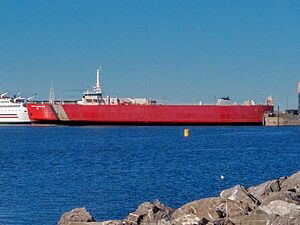
Matane has a strong and varied economy. The town is especially famous for its shrimp, known as crevettes de Matane. These northern prawns are processed right in Matane and are known worldwide for their excellent quality.
Recently, wind power has become very important to the region. Matane is home to the largest wind farm in Quebec. It also has two factories, Marmen and Enercon, that build parts for windmills.
Other important industries in Matane include:
- A Sappi factory that produces pulp for paper.
- Les Cuisines gaspésiennes, a plant that processes pork products and exports them to countries like the United States and China.
- A shipyard where ships are built or repaired.
- Béton Provincial, a large factory that makes concrete pipes.
- A sawmill, which processes wood.
Did you know that the very first Dollarama store opened in Matane in April 1992? The company decided to change its old "Larry Rossy" stores into Dollarama, and because the Matane store was so successful, they changed all their stores!
Attractions and Things to Do
Matane is often the first stop for tourists exploring the Gaspé Peninsula. Many visitors come through the town and enjoy its attractions.
The old lighthouse in Matane has been turned into a tourist information center. You can go inside and enjoy a great view of the surrounding area. There are also several art galleries in Matane that show off the talents of local artists.
The Matane River is very famous for fishing. It's even called the "River-School" in Quebec because so many people learn to fish there. The river is 101 kilometers (about 63 miles) long. It's also the only place in Quebec where you can fish right in the town square!
In the year 2000, Matane was recognized as the industrial capital of Eastern Quebec, showing its importance to the region's economy.
Notable People from Matane
Many talented people have come from Matane and the surrounding area. Some are well-known locally, while others are famous internationally.
- Claude Picher: A well-known artist.
- Yves Racine: A professional NHL ice hockey player.
Other notable people born in Matane include:
- Pascal Bérubé: A politician.
- Nancy Charest: A politician.
- Alain Côté (ice hockey, born 1957): An ice hockey player.
- Georges Dionne: A politician.
- Bruno Langlois: A cyclist.
- Sonia LeBel: A politician.
- Jacques Lemieux: An NHL ice hockey player.
- Joseph Rouleau: A famous opera singer.
- Ève Salvail: A model.
- Richard Z. Sirois: A comedian.
- Rodrigue Tremblay: An economist.
Images for kids
See also
 In Spanish: Matane para niños
In Spanish: Matane para niños
 | Selma Burke |
 | Pauline Powell Burns |
 | Frederick J. Brown |
 | Robert Blackburn |



